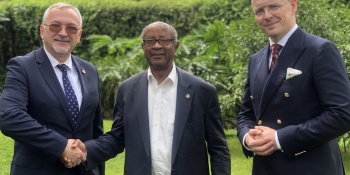Published: 05.08.2020

In the last few days, the possibility of termination of the Istanbul Convention by Poland has been intensely discussed. This document contains a number of ideological provisions under the guise of fighting against violence towards women. An important problem concerning the Convention is the fact that its Polish translation published in the Journal of Laws does not match original versions of the Convention (in French and English). It is not consistent with the Polish translation available on the website of the Council of Europe, either. According to the provisions of international law, the text binding upon states-parties to treaties is the original language version. In the case of the Istanbul Convention, there are two such texts: in French and in English. The submission of a wrong translation during the ratification of an international agreement is also a violation of the law.
TEXT OF THE CONVENTION VALID IN POLAND – LINK
ENGLISH TEXT OF THE CONVENTION – LINK
FRENCH TEXT OF THE CONVENTION – LINK
Article 3(c) of the Istanbul Convention precisely defines the meaning of gender as ‘socially constructed roles, behaviours, activities and attributes that a given society considers appropriate for women and men’. It differs from the term sex, which stands for sex in its proper biological sense.
According to the Vienna Convention on the Law of Treaties, which is the primary act of international law regulating the aspects of application and interpretation of international agreements, the valid text of the document is the one published in the original language. In the primary language version of the Convention, the term gender (French: genre) appears 25 times in various contexts (e.g., gender equality, gender-sensitive policy, gender perspective, gender-based violence). In the Polish translation, the term gender is specified as ‘the social-cultural sex’ (which does not fully correspond to its true sense, because the concept of gender is independent of sex). Moreover, contrary to the original text, it appears only twice in the version published in the Journal of Laws. This means that gender was translated as sex in the remaining cases, which may wrongly suggest that this term refers to biological sex.
The replacement of references to sex by the introduction of the concept of gender is of huge importance for the entire legal system. The term gender assumes that femininity and masculinity are social constructs existing as a result of the dialectical battle of the sexes. This approach completely ignores the biological circumstances that determine various social roles and aspirations of women and men. From this point of view, violence is caused not by pathologies of social life, but by the very structure of social life, which must be changed by means of social engineering. When interpreted in this manner, gender is something subject to spontaneous changes because it is only a conventional term. Consequently, many different versions of genders exist for the advocates of this approach. There is a differentiation between such concepts as cisgender (a person identified with his/her sex determined at birth), transgender (a person does not identify with his/her sex determined at birth), genderfluid (a person identifies with various genders successively), agender (a person does not identify with any gender), bigender (a person identifies with two genders at the same time), polygender (a person identifies with many different genders at the same time).
Moreover, pursuant to the provisions of the Ordinance of the Council of Ministers regarding the exercise of some provisions of the Act on International Agreements, all translations used by Polish public authorities participating in the agreement ratification procedure should be marked with the clause ‘for conformity with the original’. The authentication is carried out by the body that submits a request for the initiation of each successive stage of the ratification procedure. In the case of the translation delivered in the course of work on the Act approving the ratification of the Istanbul Convention, the authentication was carried out by the Deputy Head of the Office of the Government Plenipotentiary for Equal Treatment Monika Ksieniewicz. At the time of submitting the draft act to the Marshal of the Sejm, the function of Government Plenipotentiary for Equal Treatment was being fulfilled by Agnieszka Kozłowska-Rajewicz.
‘A wrong translation involves tremendous consequences. The degree of fulfilment of the provisions of the Convention by Poland will be evaluated in consideration of the English text and the French text as a consequence of the rules applicable pursuant to the Vienna Convention on the Law of Treaties. We should also remember that the translation-related faults and the very introduction of the construct of gender into national law were the reasons for which the Istanbul Convention was found to be unconstitutional by the Bulgarian Constitutional Tribunal,’ comments counsellor Bartosz Zalewski from the Centre of Legislative Analysis of Ordo Iuris Institute.

29.05.2025
• Proceedings in the case of the German Mori family have concluded at the District Court in Gdańsk.

23.05.2025
• The Ordo Iuris Institute co-organized the 2nd Pan-African Conference on Family Values in Nairobi and was invited to take part in the Kenyan government’s celebration of International Day of Families.

14.05.2025
• In Nairobi, the 2nd Pan-African Conference on Family Values is taking place with the participation of representatives from Ordo Iuris.

12.05.2025
In a significant development for Poland’s conservative movement, the newly established Stańczyk Club in Warsaw hosted its first Coalition Meeting last Friday. This event marks the introduction of a model of center-right collaboration that has been influential in the United States since the early 1990s.